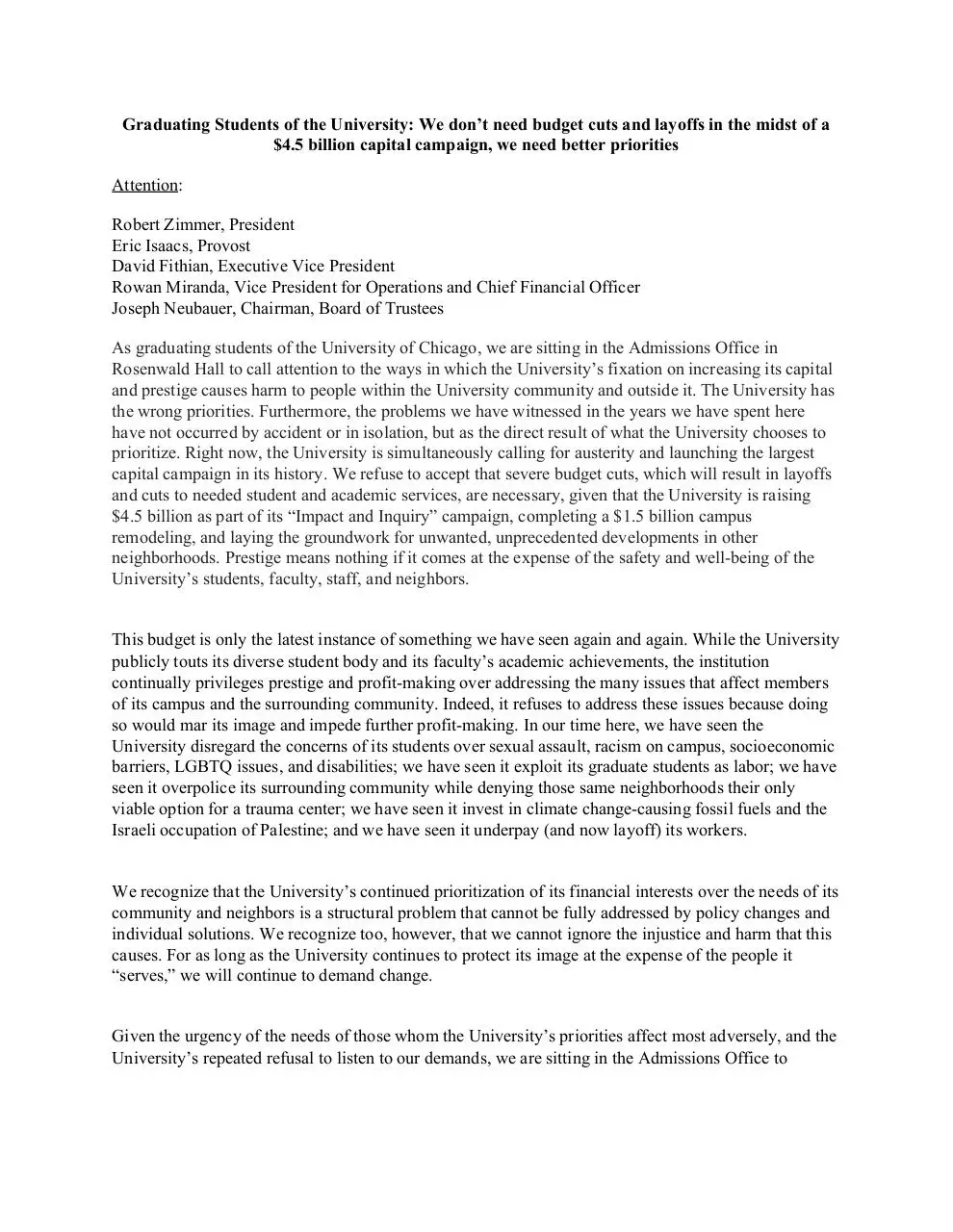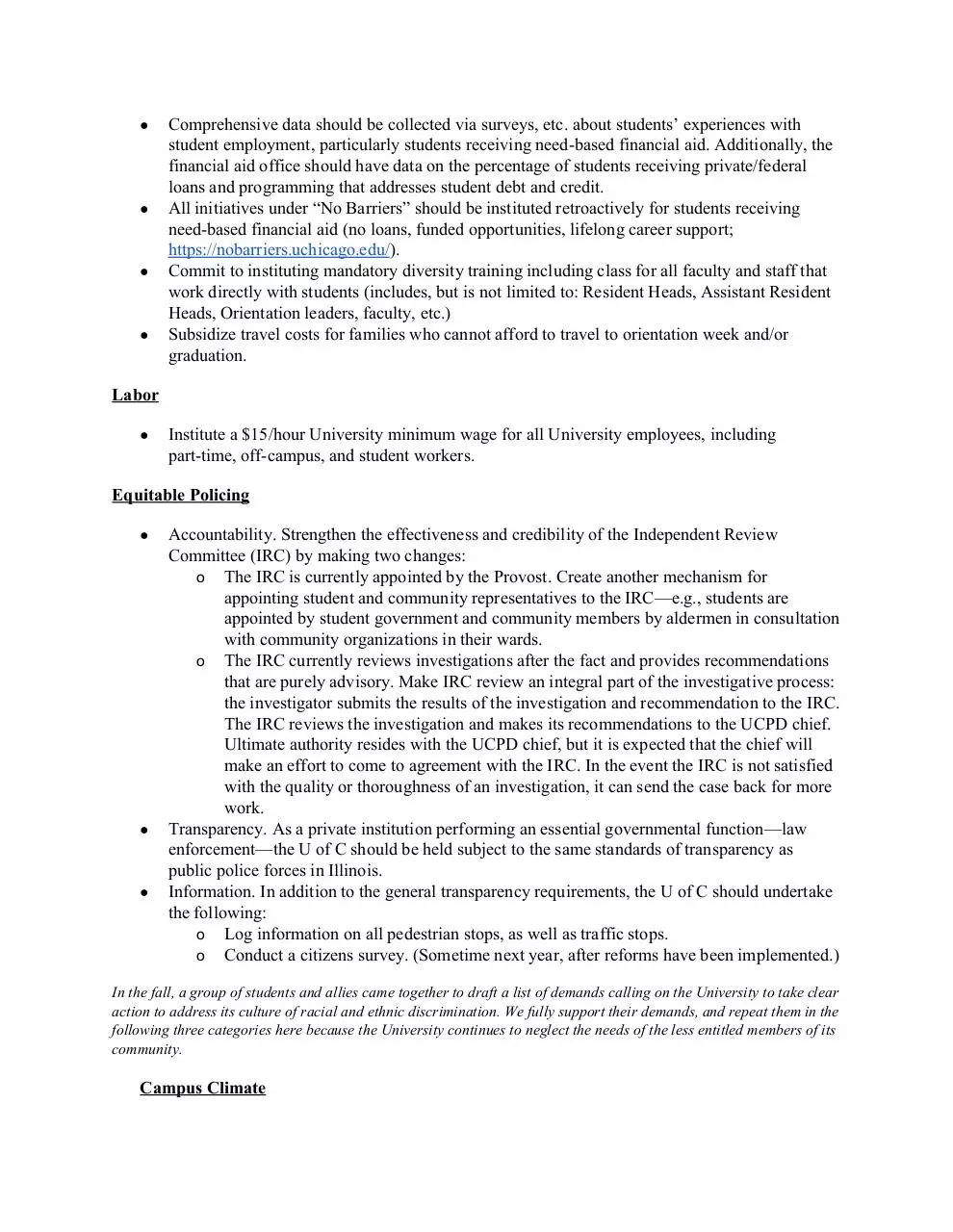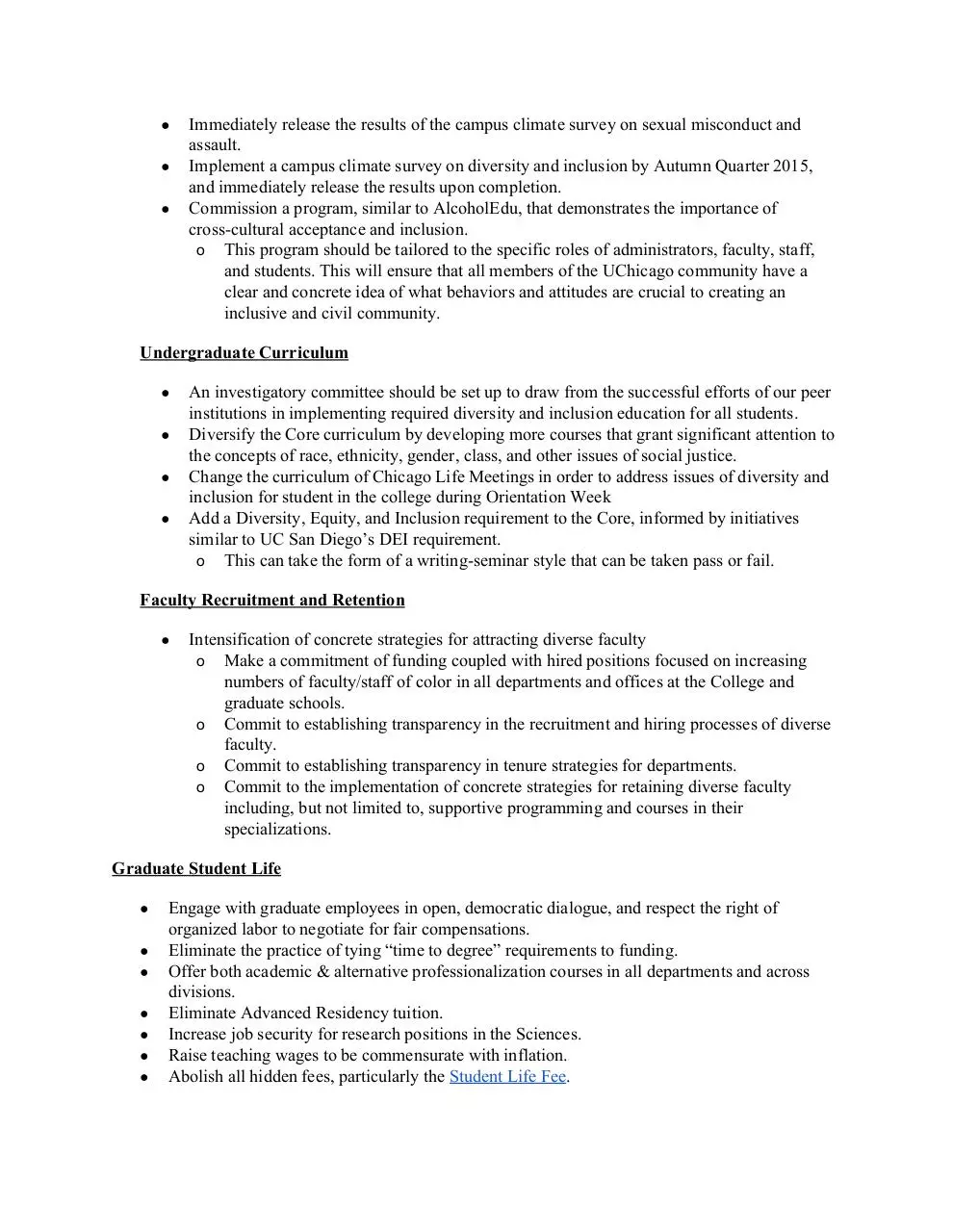OurDemands.docx (PDF)
File information
This PDF 1.4 document has been generated by , and has been sent on pdf-archive.com on 08/06/2015 at 18:10, from IP address 128.135.x.x.
The current document download page has been viewed 1387 times.
File size: 220.9 KB (6 pages).
Privacy: public file





File preview
Graduating Students of the University: We don’t need budget cuts and layoffs in the midst of a
$4.5 billion capital campaign, we need better priorities
Attention
:
Robert Zimmer, President
Eric Isaacs, Provost
David Fithian, Executive Vice President
Rowan Miranda, Vice President for Operations and Chief Financial Officer
Joseph Neubauer, Chairman, Board of Trustees
As graduating students of the University of Chicago, we are sitting in the Admissions Office in
Rosenwald Hall to call attention to the ways in which the University’s fixation on increasing its capital
and prestige causes harm to people within the University community and outside it. The University has
the wrong priorities. Furthermore, the problems we have witnessed in the years we have spent here
have not occurred by accident or in isolation, but as the direct result of what the University chooses to
prioritize. Right now, the University is simultaneously calling for austerity and launching the largest
capital campaign in its history.
We refuse to accept that severe budget cuts, which will result in layoffs
and cuts to needed student and academic services, are necessary, given that the University is raising
$4.5 billion as part of its “Impact and Inquiry” campaign, completing a $1.5 billion campus
remodeling, and laying the groundwork for unwanted, unprecedented developments in other
neighborhoods. Prestige means nothing if it comes at the expense of the safety and wellbeing of the
University’s students, faculty, staff, and neighbors.
This budget is only the latest instance of something we have seen again and again. While the University
publicly touts its diverse student body and its faculty’s academic achievements, the institution
continually privileges prestige and profitmaking over addressing the many issues that affect members
of its campus and the surrounding community. Indeed, it refuses to address these issues because doing
so would mar its image and impede further profitmaking. In our time here, we have seen the
University disregard the concerns of its students over sexual assault, racism on campus, socioeconomic
barriers, LGBTQ issues, and disabilities; we have seen it exploit its graduate students as labor; we have
seen it overpolice its surrounding community while denying those same neighborhoods their only
viable option for a trauma center; we have seen it invest in climate changecausing fossil fuels and the
Israeli occupation of Palestine; and we have seen it underpay (and now layoff) its workers.
We recognize that the University’s continued prioritization of its financial interests over the needs of its
community and neighbors is a structural problem that cannot be fully addressed by policy changes and
individual solutions. We recognize too, however, that we cannot ignore the injustice and harm that this
causes. For as long as the University continues to protect its image at the expense of the people it
“serves,” we will continue to demand change.
Given the urgency of the needs of those whom the University’s priorities affect most adversely, and the
University’s repeated refusal to listen to our demands, we are sitting in the Admissions Office to
demand the University release the details of its budget cuts, and to demand negotiations with one of the
abovementioned decisionmakers about the belowlisted demands.
Budget
We demand that the University not make these budget cuts at all. We especially demand that it meet the
following provisions:
● No layoffs to lowwage workers.
● No reductions in student job opportunities and assistance, and protections for all resources that
help lowincome students.
● No cuts to academic budgets, which will only further increase the exploitation of adjuncts and
graduate students as underpaid labor.
● No cuts to jobs that will require faculty to take on additional administrative tasks.
Campus Sexual Violence and Title IX Compliance
●
●
●
●
Provide all University of Chicago students with ongoing comprehensive education and
resources on: consent; sexual assault, intimate partner violence, domestic violence, and
stalking; student’s rights under Title IX; and how to report genderbased violence at UChicago
and in the community.
o Starting in fall 2015, incorporate this comprehensive education and information about
resources at the “UChoose” Chicago Life Meeting after Sex Signals for college
students.
o Starting in fall 2016, replace Sex Signals with a program that incorporates survivor
narratives and acknowledges the harsh reality of sexual and genderbased violence.
o Starting in fall 2015, establish inperson comprehensive educational programs at all
graduate and professional schools.
Provide public and easily accessible information online for students in multiple languages that
outlines what their rights and options are when they report sexual violence, domestic violence,
intimate partner violence, and stalking.
o This should include flowcharts and timelines of the reporting processes at UChicago.
Release aggregate data from the past two years to supplement information that the University
has to release as per the Clery Act;
o This should include data about the number of reports that go to a disciplinary process,
how many of “the accused” are found responsible, and what the sanctions are for
“responsible” students (e.g., suspension)
o This data should be released semiannually, as at Yale.
o Release the campus climate survey results before the end of the spring quarter of 2015.
University committees addressing sexual and genderbased violence must include student
advocates and survivors. This includes Provostappointed committees that review changes to
the Policy on Unlawful Harassment and Sexual Misconduct.
Socioeconomic Diversity
●
●
●
●
Comprehensive data should be collected via surveys, etc. about students’ experiences with
student employment, particularly students receiving needbased financial aid. Additionally, the
financial aid office should have data on the percentage of students receiving private/federal
loans and programming that addresses student debt and credit.
All initiatives under “No Barriers” should be instituted retroactively for students receiving
needbased financial aid (no loans, funded opportunities, lifelong career support;
https://nobarriers.uchicago.edu/
).
Commit to instituting mandatory diversity training including class for all faculty and staff that
work directly with students (includes, but is not limited to: Resident Heads, Assistant Resident
Heads, Orientation leaders, faculty, etc.)
Subsidize travel costs for families who cannot afford to travel to orientation week and/or
graduation.
Labor
●
Institute a $15/hour University minimum wage for all University employees, including
parttime, offcampus, and student workers.
Equitable Policing
●
●
●
Accountability. Strengthen the effectiveness and credibility of the Independent Review
Committee (IRC) by making two changes:
o The IRC is currently appointed by the Provost. Create another mechanism for
appointing student and community representatives to the IRC—e.g., students are
appointed by student government and community members by aldermen in consultation
with community organizations in their wards.
o The IRC currently reviews investigations after the fact and provides recommendations
that are purely advisory. Make IRC review an integral part of the investigative process:
the investigator submits the results of the investigation and recommendation to the IRC.
The IRC reviews the investigation and makes its recommendations to the UCPD chief.
Ultimate authority resides with the UCPD chief, but it is expected that the chief will
make an effort to come to agreement with the IRC. In the event the IRC is not satisfied
with the quality or thoroughness of an investigation, it can send the case back for more
work.
Transparency. As a private institution performing an essential governmental function—law
enforcement—the U of C should be held subject to the same standards of transparency as
public police forces in Illinois.
Information. In addition to the general transparency requirements, the U of C should undertake
the following:
o Log information on all pedestrian stops, as well as traffic stops.
o Conduct a citizens survey. (Sometime next year, after reforms have been implemented.)
In the fall, a group of students and allies came together to draft a list of demands calling on the University to take clear
action to address its culture of racial and ethnic discrimination. We fully support their demands, and repeat them in the
following three categories here because the University continues to neglect the needs of the less entitled members of its
community.
Campus Climate
●
●
●
Immediately release the results of the campus climate survey on sexual misconduct and
assault.
Implement a campus climate survey on diversity and inclusion by Autumn Quarter 2015,
and immediately release the results upon completion.
Commission a program, similar to AlcoholEdu, that demonstrates the importance of
crosscultural acceptance and inclusion.
o This program should be tailored to the specific roles of administrators, faculty, staff,
and students. This will ensure that all members of the UChicago community have a
clear and concrete idea of what behaviors and attitudes are crucial to creating an
inclusive and civil community.
Undergraduate Curriculum
●
●
●
●
An investigatory committee should be set up to draw from the successful efforts of our peer
institutions in implementing required diversity and inclusion education for all students.
Diversify the Core curriculum by developing more courses that grant significant attention to
the concepts of race, ethnicity, gender, class, and other issues of social justice.
Change the curriculum of Chicago Life Meetings in order to address issues of diversity and
inclusion for student in the college during Orientation Week
Add a Diversity, Equity, and Inclusion requirement to the Core, informed by initiatives
similar to UC San Diego’s DEI requirement.
o This can take the form of a writingseminar style that can be taken pass or fail.
Faculty Recruitment and Retention
●
Intensification of concrete strategies for attracting diverse faculty
o Make a commitment of funding coupled with hired positions focused on increasing
numbers of faculty/staff of color in all departments and offices at the College and
graduate schools.
o Commit to establishing transparency in the recruitment and hiring processes of diverse
faculty.
o Commit to establishing transparency in tenure strategies for departments.
o Commit to the implementation of concrete strategies for retaining diverse faculty
including, but not limited to, supportive programming and courses in their
specializations.
Graduate Student Life
●
●
●
●
●
●
●
Engage with graduate employees in open, democratic dialogue, and respect the right of
organized labor to negotiate for fair compensations.
Eliminate the practice of tying “time to degree” requirements to funding.
Offer both academic & alternative professionalization courses in all departments and across
divisions.
Eliminate Advanced Residency tuition.
Increase job security for research positions in the Sciences.
Raise teaching wages to be commensurate with inflation.
Abolish all hidden fees, particularly the
Student Life Fee
.
●
●
●
●
●
Partner with graduateemployees to improve teacher training on issues of diversity and
accessibility.
Institutionalize graduate feedback in department hiring processes.
Improve availability of information on and resources to adequately deal with sexual
harassment.
Enable all graduateemployees to access affordable and reliable child care, and extend child
care stipends and parental leave policy to all MA and International student parents.
Enforce transparency about health care costs, and distinguish fees from benefits.
Social Service Administration (SSA) Student Demands
●
●
●
Collaborate with students and a thirdparty, applied research organization to create a 5year
strategic plan to understand and address the oppression of marginalized students at SSA.
Hire a fulltime staff member (AntiOppression Coordinator) on a 5year contract to
coordinate the implementation of the 5year strategic plan, who regularly reports to the
student body. On the hiring committee for the AntiOppression Coordinator there must be a
student representative elected by peers.
Make an institutional commitment to transparency on who at SSA holds responsibility for
addressing student grievances about bias in the classroom and what accountability
measures exist for ANY teaching staff.
LGBTQ Student Life Issues
●
●
●
Expand the Office of LGBTQ Student Life from one to three fulltime staff
Make all singleuser restrooms explicitly gender neutral
Have gender neutral, singleuser and accessible restrooms in every building on campus
Climate Change
● Immediately freeze any new investments in the most carbonintensive fossil fuel extraction
companies.
● Divest from direct ownership and any comingled funds that include fossil fuel public equities
and corporate bonds within five years.
● Implement climate and carbon risk assessment into the University's shortterm and longterm
investment strategies.
Israeli Occupation of Palestine
Long term:
● Answer to Palestinian civil society’s call to boycott Israeli academic, research, and
governmental institutions until the end of the Israeli Occupation.
Short term:
● Discontinue the Jerusalem study abroad program until the Israeli occupation ends.
Trauma Center
Long term:
Open an adult levelone trauma center at the University of Chicago Medical Center.
Short term:
● Commit to involving community input in the current feasibility study.
● Raise the age of the current pediatric trauma care facility to 21.
●
Download OurDemands.docx
OurDemands.docx.pdf (PDF, 220.9 KB)
Download PDF
Share this file on social networks
Link to this page
Permanent link
Use the permanent link to the download page to share your document on Facebook, Twitter, LinkedIn, or directly with a contact by e-Mail, Messenger, Whatsapp, Line..
Short link
Use the short link to share your document on Twitter or by text message (SMS)
HTML Code
Copy the following HTML code to share your document on a Website or Blog
QR Code to this page

This file has been shared publicly by a user of PDF Archive.
Document ID: 0000267704.